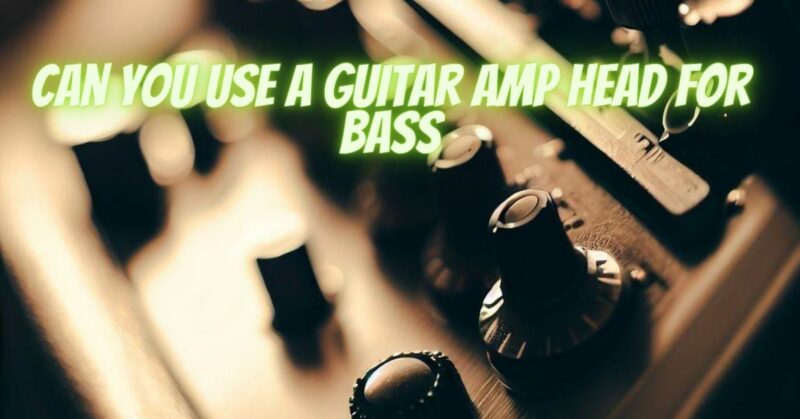As a bass player, you may find yourself wondering if it’s possible to use a guitar amp head for your bass guitar. While guitar amp heads offer a range of tonal options and versatility, there are important considerations to keep in mind when using them with a bass guitar. In this article, we will explore the potential use of guitar amp heads for bass and discuss the limitations and factors to consider before incorporating them into your bass rig.
Power Handling and Speaker Considerations:
One of the primary considerations when using a guitar amp head for bass is power handling and speaker compatibility. Guitar amp heads are typically designed to handle the midrange and high frequencies produced by electric guitars. Bass guitars produce lower frequencies that demand more power and require speakers capable of accurately reproducing those frequencies. Using a guitar amp head designed for guitar may result in inadequate power handling and potential damage to the speakers when handling the lower frequencies of a bass guitar.
Low-End Response and Tone:
Bass guitars require ample low-end response and the ability to reproduce the lower frequencies accurately to achieve a well-defined and balanced tone. Guitar amp heads may not be optimized to handle the extended low frequencies produced by a bass guitar. As a result, using a guitar amp head for bass can lead to a loss of low-end presence, muddiness, or lack of clarity in the bass tone.
Tonal Adjustments and EQ Considerations:
Another factor to consider is the tonal adjustments and equalization (EQ) options available on guitar amp heads. Guitar amp heads typically have EQ controls designed to shape the midrange and treble frequencies, catering to the tonal needs of electric guitars. Bass guitars often require specific low-frequency adjustments to enhance the low-end response and achieve a balanced tone. Guitar amp heads may not offer the necessary EQ options to properly shape the bass guitar’s tone and control its low-end frequencies.
Alternative Solutions:
If a dedicated bass amplifier is not available, there are alternative solutions to consider:
- Bass Amp Simulator Pedals: Utilizing bass amp simulator pedals can be a viable option when using a guitar amp head. These pedals are designed to replicate the characteristics and tonal characteristics of bass amplifiers, providing a more suitable tone and frequency response for bass guitar.
- DI Box and PA System: Connecting your bass guitar to a direct injection (DI) box and utilizing a full-range PA system can provide a reliable solution. This setup allows for accurate frequency reproduction, ensuring that the low-end frequencies of your bass are faithfully reproduced. However, be cautious of the power and volume levels to avoid damaging the PA speakers.
- Dedicated Bass Amplifier: Investing in a dedicated bass amplifier is the most recommended long-term solution. Bass amplifiers are specifically designed to handle the unique frequency range and power demands of bass guitars, providing optimized power handling, speaker configurations, and EQ options to deliver the best bass tone.
While it may be tempting to use a guitar amp head for bass, it is generally not recommended due to the differences in power handling, speaker compatibility, low-end response, and tonal shaping. Dedicated bass amplifiers are designed to handle the unique requirements of bass guitars, ensuring optimal power handling, speaker configurations, and EQ options to deliver a well-defined, balanced, and powerful bass tone. If a dedicated bass amplifier is not available, alternative solutions such as bass amp simulator pedals or utilizing a DI box with a full-range PA system can provide a more suitable and safer option for amplifying your bass guitar.


